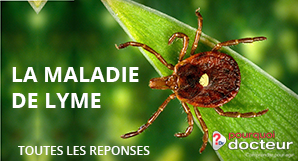Two diseases concentrate the concern of the French this summer: Lyme and Zika. They are better informed about the second but worry more about the consequences of the first.

- Lyme disease, transmitted by ticks, is thought to have infected some 27,000 people in France.
- Some infectious disease physicians accuse the authorities of ignoring the chronic forms and authorizing inefficient tests. 100 of them signed a platform.
- The Zika virus is present in the French overseas departments where it has infected 74,900 people.
- Among metropolitan residents, 800 returned from an endemic area carrying the infection. 267 were infected during the summer.
Lyme and Zika: at first glance, these pathologies have nothing in common except their mode of transmission, via a vector. The tick in the first case, the mosquito in the second. In fact, they share another trait, in view of the last “French health record” produced by Odoxa on behalf of the MNH mutual insurance company (1): both arouse the concern of those questioned.
Zika worries the metropolis
An emerging disease in the public sphere, the Zika virus has stood out for its spectacular effects on pregnant women. Exposed fetuses are at greater risk for microcephaly and other neurological malformations. The mosquitoes that are vectors of this infection belong to the family of Aedes. Since 2004, the tiger mosquito (Aedes albopictus) is established on French soil, justifying the alerts that have multiplied during the summer regarding the arrival of the virus in metropolitan France.
Perhaps this is why 84% of French people say they have heard of Zika. If their level of knowledge on the subject is moderate for many of them, the fears are present. 62% thus express a concern about a spread in metropolitan France. Women and seniors are more likely to admit it.
Moderate caution
Fearful, of course, but not to the point of implementing all the precautionary measures. Only 57% of respondents say they avoid areas of stagnant water – which serve as a breeding ground for mosquitoes – or monitor them. Even fewer wear long, closed clothes (49%) and use repellents (36%). Among the inhabitants of the Metropolis, 267 have been infected with the Zika virus in endemic area between May and August. The Zika epidemic ultimately did not have the scale expected. No case has arisen on French soil.

Lyme disease, which made headlines over the summer, is wrinkling much more. The French are less likely to know this disease transmitted by the tick: only half of those polled say they have heard of it. But according to pollsters, knowledge is more precise on this subject, undoubtedly because it is already a reality on the ground. This is also probably the reason why a higher proportion of respondents admit their concern. 73% fear an extension on the metropolitan territory. A well-justified apprehension: all of the regions are home to this mite and almost all of them have cases of Lyme borreliosis.
Gaps in data
27,000 people are believed to be carriers of the disease. Alsace leads the way in reports, far ahead of Rhône-Alpes and Franche-Comté. It is also in this region that a monitoring network is piloted. Between the 1e January and August 31, 2014, 276 cases were identified.
But recent data is lacking at the national level and it is probably underestimated. Because that is not the only deficiency in this sector: in a column published in July, 100 doctors denounced the lack of attention given to patients and the under-recognition of chronic forms of the disease. A plan will be presented next September. It should improve the diagnosis and care of patients.

(1) Odoxa survey for the MNH group, Le Figaro and France Inter carried out among 1,036 people representing the French population, aged 18 and over.
.















